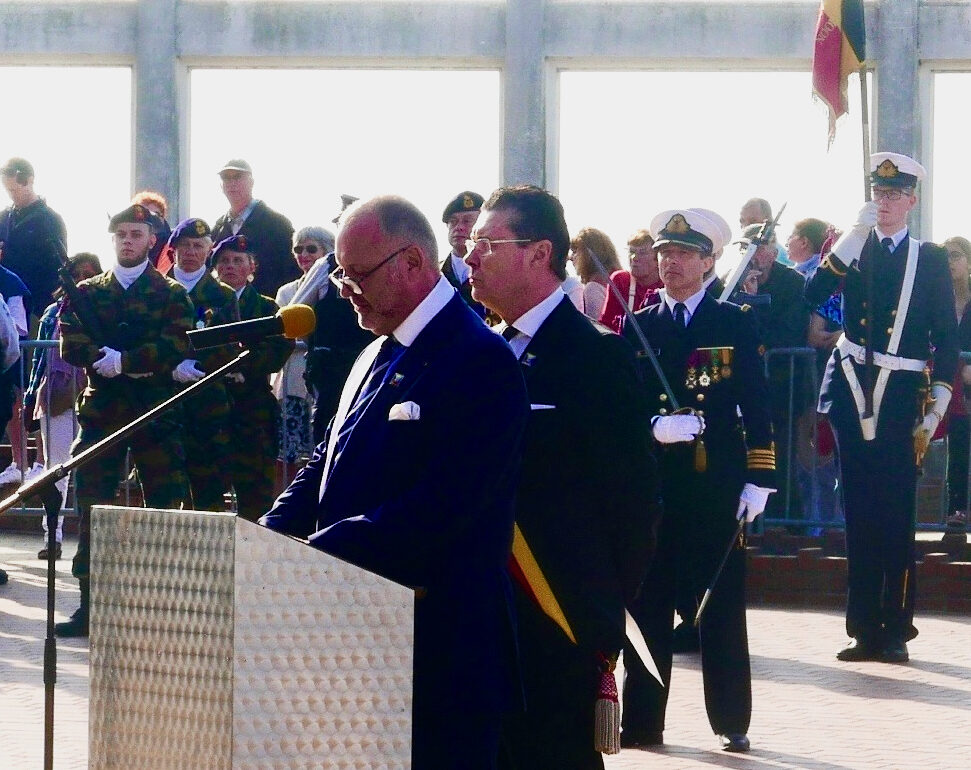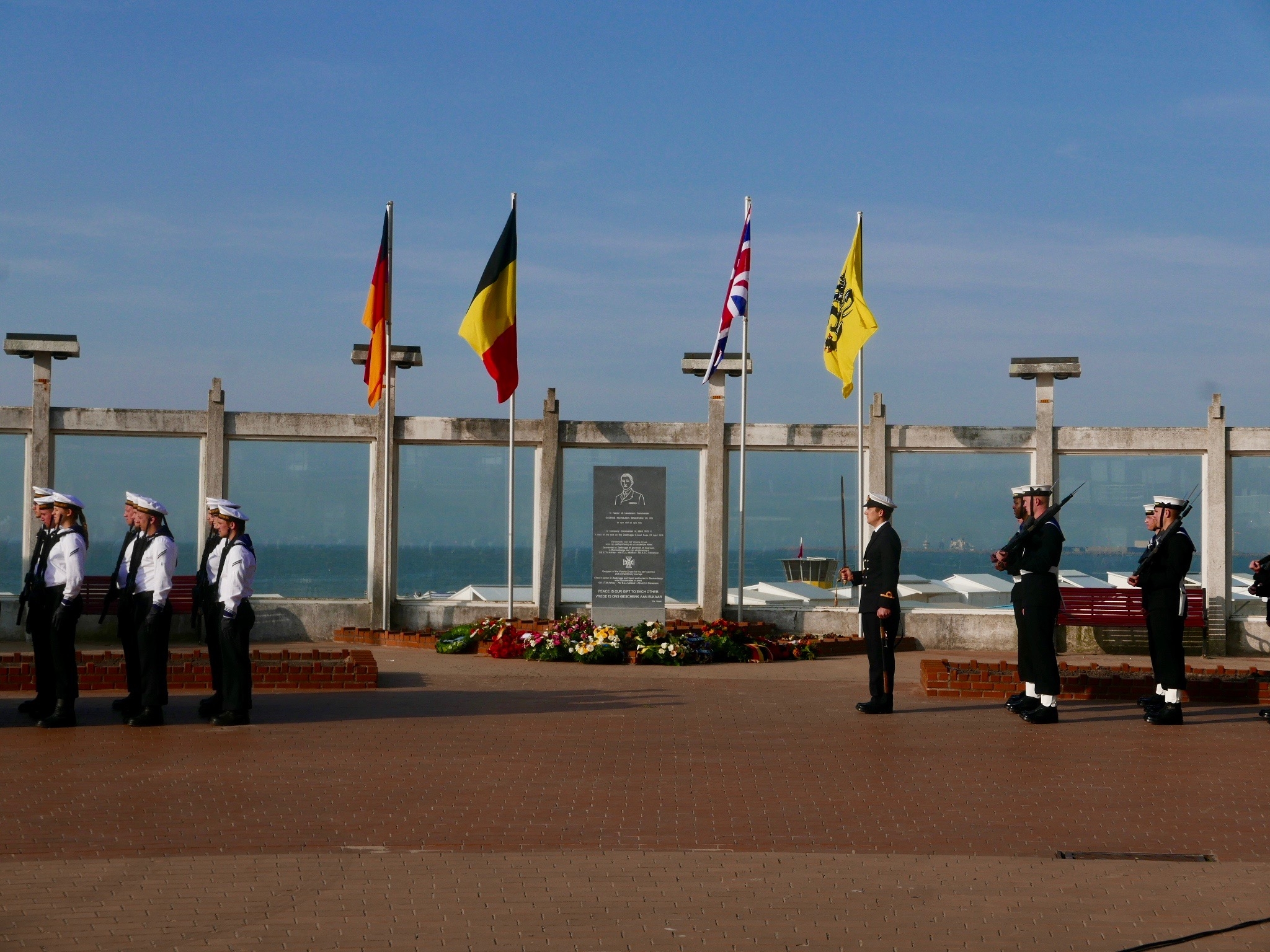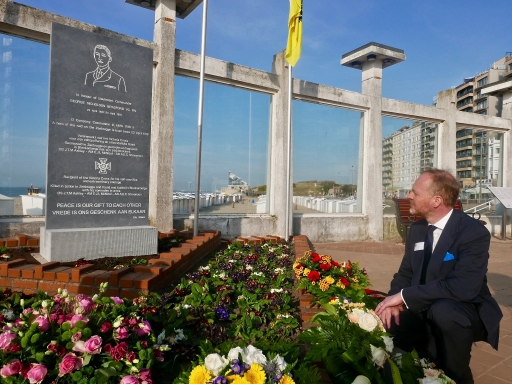A new Zeebrugge Raid memorial unveiled on the Flanders coast commemorates the British naval officer, George Nicholson Bradford, one of the only pair of brothers to both be awarded the Victoria Cross in the Great War.
It stands on the seafront at Blankenberge, within sight of the port of Zeebrugge where Lieutenant Commander Bradford was killed during the Royal Navy’s storming of the Mole, or harbour wall, on 23 April 1918.
His family have expressed their ‘heartfelt thanks’ to the people of Flanders for the centenary tribute.
Storming
100 years ago, under fire, in darkness and with his ship heaving in the North Sea swell, George Bradford jumped onto the Zeebrugge Mole to attach a parapet anchor. He was hit, and fell into the water.
Lt Cdr Bradford died on his 31st birthday.
Commemorated with him are three comrades-in-arms: Ordinary Seaman JTM Ashley, Chief Mechanician EJL McNicol, and Able Seaman AEC Stevenson. All their bodies were washed up on Blankenberge beach a few days later, and buried by the Germans in the town cemetery.
George Bradford was commanding the storming parties on HMS Iris II, a requistioned River Mersey ferry pressed into military service to help manoeuvre the lead cruiser, HMS Vindictive, alongside the Mole.
Their objective was to knock out the German guns while three blockships were sunk to stop U-boats reaching the open sea.
 A century on, Lt Cdr Bradford’s Victoria Cross citation was read by Nic Van der Marliere (above), General Representative of the Government of Flanders in the UK, who comes from Blankenberge, in front of large crowds who’d gathered on the Belgian resort’s esplanade.
A century on, Lt Cdr Bradford’s Victoria Cross citation was read by Nic Van der Marliere (above), General Representative of the Government of Flanders in the UK, who comes from Blankenberge, in front of large crowds who’d gathered on the Belgian resort’s esplanade.
The citation ends with this commendation: “Lieut.-Commander Bradford’s action was one of absolute self-sacrifice; without a moment’s hesitation he went to certain death, recognising that in such action lay the only possible chance of securing Iris II and enabling her storming parties to land.”
On behalf of George Bradford’s descendants, his great nephew, Andrew Cremer, expressed gratitude to Mr Van der Marliere and the Governor of West Flanders, Carl Decaluwé, for the memorial: “I offer you my heartfelt thanks for the unsolicited pains you have taken to preserve his memory, and indeed to preserve the memory of all those killed, wounded and lost in the Zeebrugge and Ostend raids.”
Germany’s Ambassador to Belgium, Rüdiger Lüdeking, took part in the wreath-laying. The ceremony, on April 21, was held as part of a day of Zeebrugge Centenary commemorations in Flanders.

Sailors of the German frigate, Brandenburg, and HMS Sussex, of the Royal Navy, formed the Guard of Honour (Photo: Centenary News)
George Bradford is buried in the CWGC plot at Blankenberge Town Cemetery. Roland Bradford and James Bradford both rest in France, at CWGC Hermies British Cemetery and Duisans British Cemetery respectively.
Expressing his sympathy to George Bradford’s mother, Vice-Admiral Sir Roger Keyes, commander of the Zeebrugge Raid, wrote: “I know how deeply you have suffered in this war, but to have been the mother of such splendid sons must be some consolation to you.”
Read more here in Centenary News about the Zeebrugge Raid.
Reporting from Blankenberge by CN Editor
Images: Centenary News
Additional information: Commonwealth War Graves Commission
